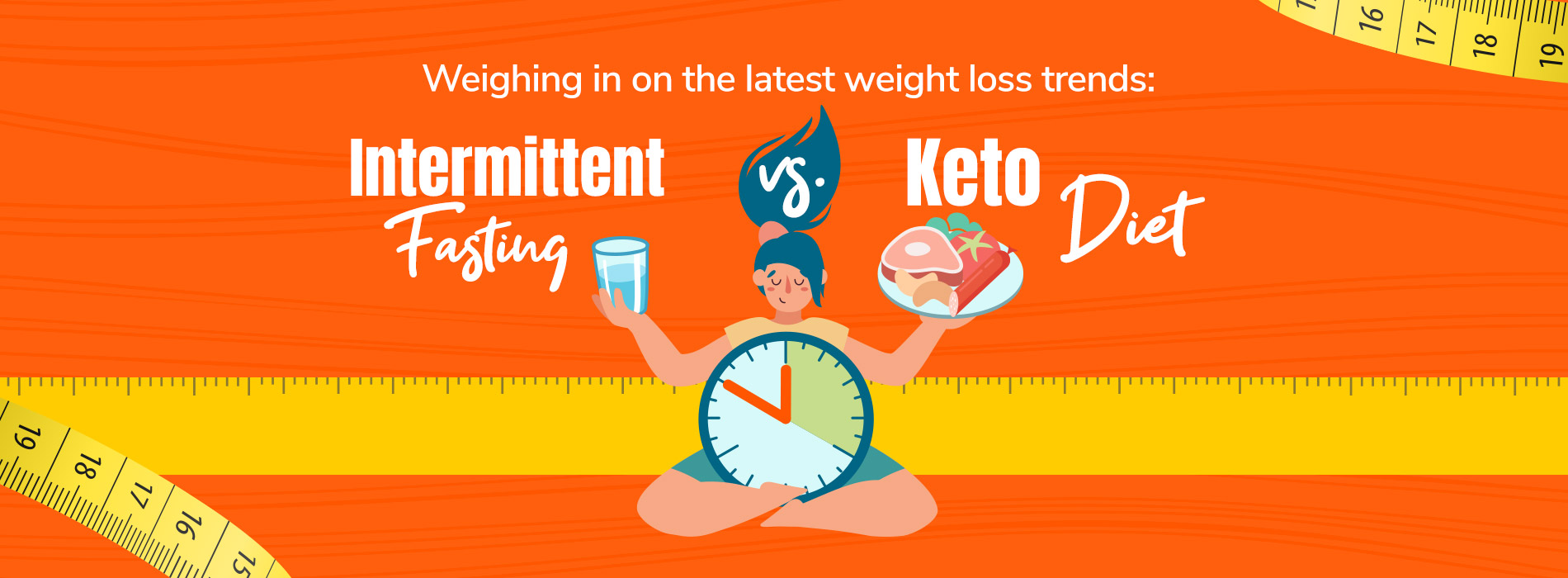A Closer Look At Intermittent Fasting or Keto Diet

In this article, we take a closer look at two of the more popular trending diets in recent years: Intermittent Fasting vs The Keto Diet. Find out how they work and which diet might fit your health goals, lifestyle and dietary preference better!
For most of us, at some point in time or another – we might have tried to hop on a diet plan, whether it is to shed some excess pounds or for a boost to our overall health. For any diet to work in the long run, in terms of playing a meaningful role in sustaining our weight management goals or to cultivate healthier eating habits - sustainability is key.
In this article, we take a closer look at two of the more popular trending diets in recent years:
Intermittent Fasting vs The Keto Diet. How do they work, what benefits do they offer and which diet might fit your health goals, lifestyle and dietary preference better?
Intermittent Fasting
What is it?
Intermittent fasting is an eating pattern that rotates between periods of fasting and normal food consumption.
Its focus is not on what to/ what not to eat but helps achieve weight loss by limiting calories during certain days of the week or during specified hours during the day.1
There are a variety of intermittent fasting options. Here are some of the popular ones:
- 16:8 Method - Fasting for 16 hours and eating during the next 8 hours
- 12:12 Method - Fasting for 12 hours and eating during the next 12 hours
- 5:2 Method - Eating normally for 5 days of the week, eating very little/restrict calories on 2 days
- Warrior Diet - Restricted intake for 20 hours and unlimited intake for the remaining 4-hour window
Benefits of Intermittent Fasting
Generally, intermittent fasting helps reduce your meal intake, causing you to consume lesser calories.
When you fast your body also releases a hormone called norepinephrine which increases focus, alertness, and energy.2
This hormone also helps to break down body fats, making them available to be burned for energy.2
Other than weight loss, studies have found that intermittent fasting can also help reduce oxidative stress, which have benefits against ageing and the development of ailments3, lower blood sugar levels4 and improve brain functions5.
Things to take note
The most common drawback of intermittent fasting is hunger, which would cause you to feel weak and irritable, and your brain not performing as well you are used to. Even though the effects are temporary, it will still take some time for your body to get used to the new routine.
People who are underweight or have a history of eating disorders should consult with a medical professional before trying it out, as they would need sufficient calories on a daily basis for proper development. People with medical conditions such as diabetes and thyroid should also avoid intermittent fasting.
Keto Diet
What is it?
Ketogenic (keto) diet is a high-fat, low-carb way of eating. The general idea behind this is that through eating a high-fat and low-carb diet over an extended period of time, your body adapts into a metabolic process known as ketosis, where your body is forced to rely on fats instead of glucose for its main source of energy.
Entering into a state of ketosis involves limiting carb consumption to around 20 to 50 grams a day, and filling up on foods such as meat, fish, eggs nuts and healthy oils6. Supplementing your body with good fats such as Fish Oi is important in a high fat diet. Coconut Oil is also a good option as provides energy for the body and brain and is not prone to storing as body fat. Avoid eating carb-based foods which are high in sugar and starch.
Benefits of a Keto Diet
During ketosis, your body becomes very efficient at burning fats into compounds called ketones for energy, leading to weight loss.
Keeping a keto diet can also be good for the heart as it helps HDL (good) cholesterol levels and improves blood pressure and blood sugar levels7.
It has also been used to treat epilepsy8 and may improve mental symptoms in people with Alzheimer’s disease9.
Things to take note
Some drawbacks of a keto diet include nutrient deficiency due to the limitations in the types of food that you can eat. Consider taking a multivitamin if you are trying it out. As your body also needs a bit of sugar to function, a low-carb diet might cause fuzzy mind and mood swings.
As the keto diet relies on your kidneys and liver to metabolise the intake of fat and protein, people with kidney issues should avoid such a diet.
So.. Which diet is for you?
When it comes to healthy weight management, there’s no one size fits all. It depends on the individual’s preference, lifestyle and whether there are any health or dietary restrictions involved.
As with most things, the key is consistency and keeping to your planned diet and fitness routine. And don’t be too hard on yourself on occasions when you do give in to your cravings. It takes a whole lot of discipline and mental strength to keep to a diet routine, so do remember to pat yourself on the back for your commitment to health and healthy weight management!
References
1https://www.health.harvard.edu/heart-health/not-so-fast-pros-and-cons-of-the-newest-diet-trend
2 https://www.healthline.com/nutrition/intermittent-fasting-and-weight-loss#hormonal-effects
3https://www.tandfonline.com/doi/full/10.1080/10942912.2018.1560312
4 https://www.sciencedirect.com/science/article/abs/pii/S193152441400200X
5 https://www.nature.com/articles/nrn.2017.156?
6https://www.ncbi.nlm.nih.gov/books/NBK499830
7 https://www.ncbi.nlm.nih.gov/pmc/articles/PMC5452247/
8 https://www.ncbi.nlm.nih.gov/books/NBK499830/
9 https://www.ncbi.nlm.nih.gov/pmc/articles/PMC6021549/










-240s-label-Front_1638x1227.jpg?sw=280&sh=210&sm=fit)




